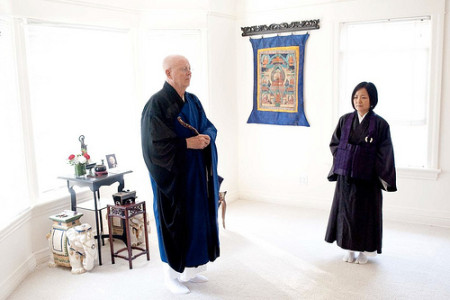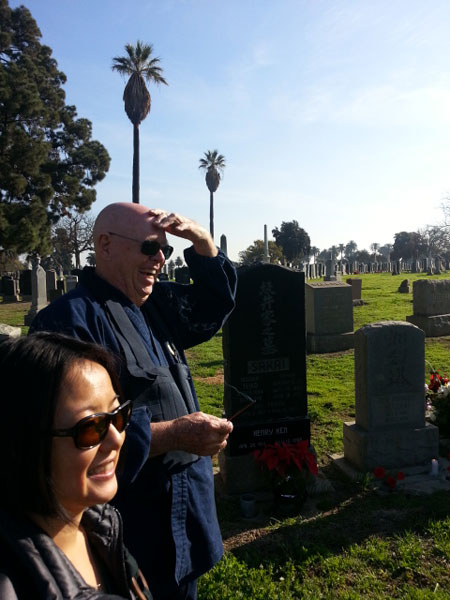Nearly everyone has an unlikely story of how they came to Zen, but at the Hazy Moon, no one’s story covers more miles than Shelley Mushoku Cao’s. As the day-to-day administrator of the Zen Center, Mushoku nearly single-handedly responds to inquiries from members and visitors, manages the practice calendar, coordinates retreats, and serves as an officer of the board. We interviewed Mushoku about how she arrived at a successful professional life and a committed personal practice.
You immigrated to the U.S. when you were 15. Tell us about your life before that.
I was born in China and lived with my grandparents in Shanghai. My parents were both physicians and medical researchers who lived and worked in a smaller city about an hour away, but they wanted me to attend better schools in Shanghai. It is common in China for kids to be raised by grandparents until school-age or later.
What is your Chinese name?
My given name is Xin. It’s pronounced shing and means “happiness” or “contentment.”
What brought your family to America?
My mom came first as part of a scholar exchange program. Same for my dad, a year later. Their stay was to be temporary, but then they decided to bring me here to finish high school. They saw it as a better way of life. It wasn’t so unusual at that time, 1987, because China had just opened up and there were more opportunities here.
How difficult was it to transition to American life?
The most difficult aspect was the language. I spoke a little English because we studied it in China as a foreign language. But I attended a high school with a large population of ESL students, so I wasn’t alone. I had a lot of friends and I made good grades. I didn’t feel social pressure because I wasn’t a part of any group. When I finished high school, I wasn’t sure what I wanted to study, but I knew I didn’t want to go to medical school! I ended up majoring in psychology at Cal State Northridge. I thought I could help people. Once I earned my bachelor’s degree I didn’t want to continue in psychology. I switched to genetics and entered a Ph.D. program at UC Riverside.
When did you become interested in Zen?
Although my parents are atheists, I was always drawn to Buddhism and interested in meditation. Chan Buddhism is well-known in China. It’s part of the culture and appears in folk tales. I went to the Zen Center of Los Angeles for the first time when I was 20 or 21 years old. After about six months, I attended my first retreat at Zen Mountain Center and had dokusan with Maezumi Roshi. Then I knew Zen was something I wanted to pursue more.
To make a long story short, you earned a Ph.D. in genetics and then an MBA in healthcare management. Is there a connection?
The connection is old age, sickness and death. My Ph.D. research subject was the genetic profiling of long-term and short-term caloric restriction in mice. The point was to learn how to retard aging, sickness and death. Now I work in health plan administration for Medi-Cal and Medicaid populations, finding ways to deliver the most benefits to people who are already old and sick. I’m able to touch a lot more people with my work.
How does the practice appear in your daily life?
I always remind myself to just take care of whatever is in front of me and not get involved in mental gymnastics. The mental gymnastics has always been an issue for me. Just recently I’ve started a new job and it’s good for me. I don’t have to rethink what I do, because I don’t know what to think in the first place!

Your practice position at the Zen Center is as the teacher’s jisha, or personal attendant. In terms of your training, what does that involve?
Seeing, hearing, and receiving the teacher’s instructions. Sometimes I cook; sometimes I clean (although he does both for himself). On a deeper level, the training is about not getting my way all the time. Nyogen Roshi is very hands-on with operations. Often he doesn’t agree with my approach. There is a saying in China that I can’t really translate. It means that you run the day-to-day but don’t make any decisions. That’s what it means to be jisha.
You’ve been practicing for 20 years, accomplished remarkable goals and established yourself in a career. What’s next?
I want to deepen my practice. Lately I’ve been asking myself what’s really important to me, and this is it: to experience a sense of freedom without fear.

